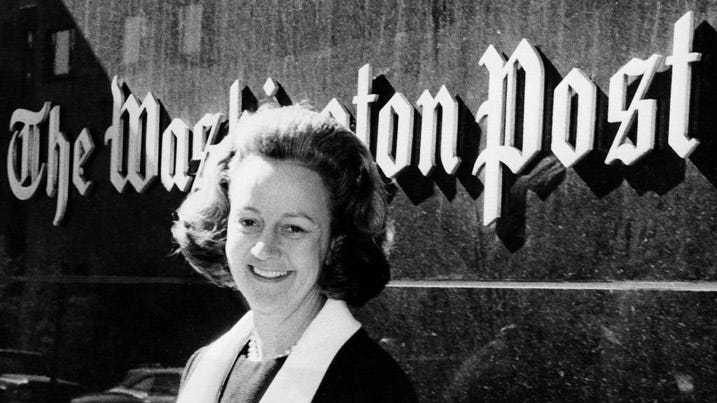Dear Mrs. Graham
In 1973, the Washington Post Company couldn’t have been a more widely revered media company. The Watergate scandal, which Bob Woodward and Carl Bernstein begun reporting on in mid-1972, came to a spectacular end with President Nixon’s resignation in August 1974. But the reverence of the publication didn’t match the company’s popularity on Wall Street. The Post—along with many other stocks at that time—was trading at historic lows.
Below is the letter that Warren Buffett wrote to Katharine Graham in June 1973 after he had acquired over 5% of the stock. By the end of the year his stake had increased to 10%. The letter gives a lot of insight into how Buffett viewed the Post—not only as an investment, but as a business with noble purposes that brings out his sentimental side.
This purchase represents a sizable commit ment to us—and an explicitly quantified compliment to the Post as a business enterprise and to you as its chief executive. Writing a check separates conviction from conversation. I recognize that the Post is Graham-controlled and Graham-managed. And that suits me fine.
Some years back, a partnership which I managed made a significant investment in the stock of Walt Disney Productions. The stock was ridiculously cheap based upon earnings, asset values and capability of management. That alone was enough to make my pulse quicken (and pocketbook open), but there was also an important extra dimension to the investment. In its field, Disney simply was the finest—hands down. Anything that didn’t reflect his best efforts—anything that might leave the customer feeling short-changed—just wasn’t acceptable to Walt Disney. He melded energetic creativity with a discipline regarding profitability, and achieved something unique in entertainment.
I feel the same way about The Washington Post. The stock is dramatically undervalued relative to the intrinsic worth of its constituent properties, although that is true of many securities in today’s markets. But, the twin attraction to the undervaluation is an enterprise that has become synonymous for quality in communications. How much more satisfying it is going to be to watch an investment in the Post grow over the years than it would be to own stock in some garden variety company which, though cheap, had no sense of purpose.
I am additionally impressed by the sense of stewardship projected by your communications to fellow shareholders. They are factual, complete and interesting as you bring your established newspaper standards for integrity to the newer field of corporate reporting.
You may remember that I was in your office about two years ago with Charles Munger, discussing the New Yorker. At the time I mentioned to you that I had received my financial start delivering the Post while attending Woodrow Wilson High in the mid 1940’s. Although I delivered about 400 Posts per day, my record of loyalty is slightly tarnished in that I also had the Times-Herald route (much smaller—my customers were discriminating) in the Westchester. This was perhaps the first faint sign to keenly perceptive Washingtonians that the two organizations eventually would get together.
I should mention that Berkshire Hathaway has no radio or television properties, so that we will not be a complicating factor with the FCC. Our only communications property is the ownership of Sun Newspapers of Omaha, a group of financially (but not editorially) insignificant weekly newspapers in the metropolitan Omaha area. Last month our whole organization, seventy people counting printing, went into orbit when we won a Pulitzer for our reporting on Boys Town’s undisclosed wealth. Incidentally, Newsweek and Time used approximately equal space in covering the story last year, but Newsweek’s reporting job was far superior.
You can see that the Post has a rather fervent fan out in Omaha. I have hopes that, as funds become available, we will add to our holdings, at which time I will send along amended 13-D filings.
Cordially, Warren E. Buffett
This letter was taken from Katharine Graham's wonderful autobiography, Personal History.



